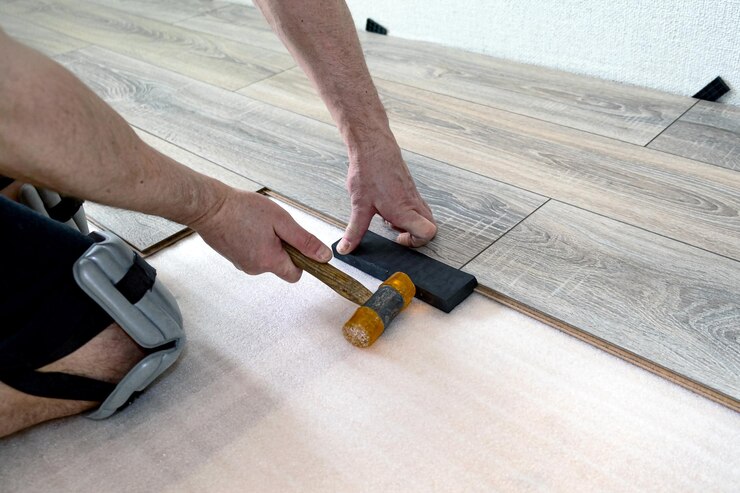
When it comes to creating a professional and functional space, the type of flooring you choose plays a pivotal role. Whether you’re revamping an office, setting up a retail store, or designing a healthcare facility, a high-quality flooring installation service can make all the difference. This guide dives deep into the essentials of commercial flooring installation services, from selecting the right material to understanding the installation process and maintenance tips.
Why Flooring Matters in Commercial Spaces
Flooring isn’t just a functional element; it’s a foundational aspect of your interior design. It impacts aesthetics, comfort, safety, and even acoustics. Here are some key reasons why flooring is critical in commercial spaces:
- Durability and Longevity: Commercial spaces endure high foot traffic, requiring robust flooring solutions that can last for years.
- Safety Compliance: Slip-resistant and fire-retardant floors ensure a safer environment for employees and customers.
- Brand Aesthetics: The flooring sets the tone for your brand’s personality, whether it’s sleek and modern or warm and inviting.
- Ease of Maintenance: Properly chosen floors can simplify cleaning routines and minimize downtime.
- Energy Efficiency: Certain flooring materials can improve insulation and reduce energy costs.
Popular Types of Commercial Flooring
Choosing the right flooring involves balancing functionality, aesthetics, and budget. Here are some popular options:
- Luxury Vinyl Tile (LVT):
- Benefits: Durable, waterproof, and versatile.
- Ideal For: Retail stores, healthcare facilities, and offices.
- Carpet Tiles:
- Benefits: Sound absorption, easy to replace, and variety of designs.
- Ideal For: Offices, conference rooms, and hospitality sectors.
- Hardwood Flooring:
- Benefits: Timeless appeal, long-lasting, and easy to clean.
- Ideal For: Boutique shops, upscale restaurants, and executive offices.
- Epoxy Flooring:
- Benefits: High durability, chemical resistance, and seamless finish.
- Ideal For: Warehouses, industrial facilities, and garages.
- Ceramic and Porcelain Tiles:
- Benefits: Water-resistant, easy to clean, and available in many designs.
- Ideal For: Restrooms, lobbies, and commercial kitchens.
- Rubber Flooring:
- Benefits: Slip-resistant, soft underfoot, and sound-dampening.
- Ideal For: Gyms, hospitals, and play areas.
- Concrete Flooring:
- Benefits: Minimalist appeal, highly durable, and easy to maintain.
- Ideal For: Retail spaces, warehouses, and modern office designs.
Factors to Consider When Choosing Commercial Flooring
- Traffic Levels: High-traffic areas need robust materials like LVT or epoxy.
- Budget: Factor in both upfront costs and long-term maintenance.
- Aesthetic Goals: Align the flooring design with your brand’s image.
- Environmental Impact: Opt for sustainable materials where possible.
- Installation Time: Some materials, like epoxy, may require longer installation times.
- Maintenance Needs: Consider how much effort and cost will go into maintaining the floor.
The Flooring Installation Process
Here’s what to expect when you hire a commercial flooring installation service:
- Initial Consultation:
- Discuss your needs, budget, and space requirements with the installer.
- Review material samples and finalize your choice.
- Site Assessment:
- Inspect the subfloor for cracks, moisture, or uneven surfaces.
- Determine any preparation needs, such as leveling or moisture barriers.
- Preparation:
- Remove old flooring and clean the subfloor thoroughly.
- Apply primers or underlays as needed.
- Installation:
- Install the flooring material as per manufacturer’s guidelines.
- Ensure tight seams and secure adhesion.
- Finishing Touches:
- Add trims, baseboards, or transitions for a polished look.
- Conduct a thorough quality check.
- Post-Installation Care:
- Provide maintenance guidelines and a cleaning schedule.
Common Challenges in Commercial Flooring Installation
- Subfloor Issues: Cracks or moisture can compromise the installation.
- Tight Deadlines: Managing timelines in busy commercial spaces.
- Heavy Equipment: Moving and working around machinery or fixtures.
- Noise Restrictions: Installing without disrupting daily operations.
- Material Shortages: Ensuring timely availability of chosen materials.
Maintenance Tips for Longevity
- Regular Cleaning: Vacuum or sweep daily to remove dirt and debris.
- Immediate Spill Cleanup: Prevent stains and damage by addressing spills promptly.
- Periodic Inspections: Check for wear and tear, especially in high-traffic areas.
- Protective Measures: Use mats at entrances and furniture pads to minimize damage.
- Professional Maintenance: Schedule deep cleaning or refinishing as needed.
Choosing the Right Flooring Installation Service
Not all flooring contractors are created equal. Here’s how to select the best:
- Experience: Look for companies with a proven track record in commercial projects.
- Certifications: Ensure installers are licensed and certified.
- Portfolio: Review previous projects for quality and design.
- References: Check reviews and ask for client testimonials.
- Warranty: Opt for services that offer a robust warranty on both materials and labor.
Sustainable Flooring Solutions
Eco-friendly flooring is becoming a top choice for many businesses. Options include:
- Bamboo Flooring: Renewable and durable.
- Cork Flooring: Natural, sound-dampening, and comfortable.
- Recycled Materials: Carpets or tiles made from recycled content.
- Low-VOC Options: Reducing indoor air pollution.
The Cost of Commercial Flooring Installation
Costs vary depending on material, area size, and complexity. Here’s a rough breakdown:
- Luxury Vinyl Tile: $2-$7 per sq. ft.
- Carpet Tiles: $3-$10 per sq. ft.
- Hardwood Flooring: $8-$15 per sq. ft.
- Epoxy Flooring: $3-$12 per sq. ft.
- Ceramic Tiles: $5-$15 per sq. ft.
Additional costs may include subfloor preparation, removal of old flooring, and special finishes.
Final Thoughts
Investing in high-quality commercial flooring installation services is a decision that pays off in durability, aesthetics, and functionality. By carefully selecting the right materials and partnering with experienced professionals, you can create a space that’s both practical and visually appealing. Remember, your flooring is more than a surface—it’s the foundation of your business environment.